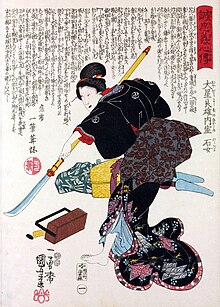
Back أونا بوغيشا Arabic Onna-bugeisha Catalan Onna bugejša Czech Onna-musha German Onna-musha Spanish Onna-musha Basque اونا بوگیشا Persian Onna-bugeisha French Onna-bugeisha Galician Onna-bugeisa Hungarian

Onna-musha (女武者) is a term referring to female warriors in pre-modern Japan,[1][2] who were members of the bushi (warrior) class. They were trained in the use of weapons to protect their household, family, and honour in times of war;[3][4] many of them fought in battle alongside samurai men.[5][6]
Onna-musha also have an important presence in Japanese literature, with Tomoe Gozen and Hangaku Gozen being famous and influential examples.[5]
- ^ DeMarco, Michael; et al. (Ellis Amdur) (2016-07-01). "The Role of Arms Bearing Women in Japanese History". Women and Asian Martial Traditions. Via Media Publishing. pp. 7–45. ISBN 978-1-893765-28-3.
- ^ 英和字典 (An English and Japanese Dictionary). 知新館. 1872. p. 22.
amazon, n. -- 女武者
- ^ Joyce, Thomas Athol (1915). "Japan by Clive Holland". Women of All Nations: A Record of Their Characteristics, Habits, Manners, Customs, and Influence. Funk & Wagnalls Company. p. 508.
- ^ Jersey, M.E. (1893). "The Transformation of Japan". The Nineteenth Century: A Monthly Review. Nineteenth Century and After, Limited. p. 379.
- ^ a b Turnbull, Stephen (2012-01-20). "Chapter: Introduction". Samurai Women 1184–1877. Bloomsbury Publishing. pp. 4–6. ISBN 978-1-84603-952-2.
- ^ Perez, Louis G. (1998). The History of Japan. Greenwood Publishing Group. p. 35. ISBN 978-0-313-30296-1.